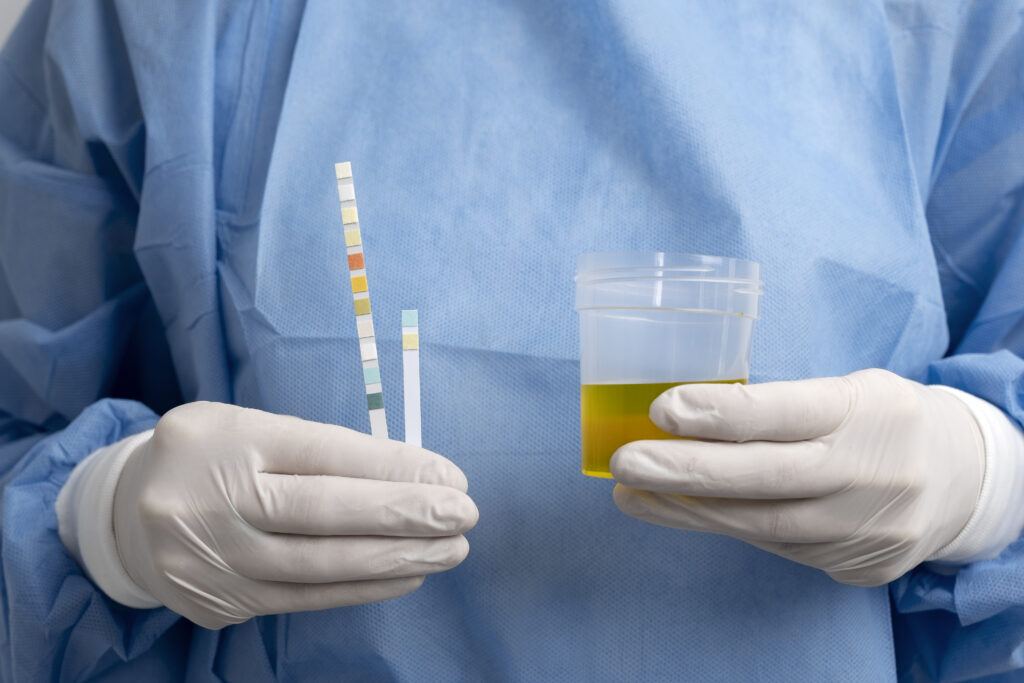A urine drug test is a lab examination of a urine specimen directed at identifying the use of medications and metabolized items. This non-destructive technique is one of the most popular screening devices in all healthcare, occupational, and court-related matters. It allows the employer, doctor, and law enforcement to discover the presence of substances that have been used or abused recently.
As compared to blood tests, where drugs can only be identified within a shorter period, urine tests provide a longer detection time; thus, it can be effective where continued surveillance programs are conducted or in random screenings.
Purpose of a Urine Drug Test
There are various valuable purposes of urine drug testing. The motivation to test usually drives what is tested and how the findings are interpreted.
Workplace Testing
Urine drug test is practiced by most employers when conducting job interviews or in random screening programs within the workplace. This is especially typical in the employment of people whose job requires high levels of safety such as transportation, manufacturing, or healthcare. Such tests contribute to the drug-free workplace and improve safety conditions, as well as the adherence to the legal or industry regulations, e.g., Department of Transportation (DOT).
Medical and Clinical Monitoring
Within a medical setting, medical professionals can order urine-based drug screening to keep track of patients taking prescription drugs like opioids or benzodiazepines. It can confirm patients regarding the order of treatment, check the drug misuse, or verify interactions of drugs taken that may harm the health status.
Legal and Forensic Applications
Urine drug tests can be in the form of court-admissible evidence in a legal argument; this is the case where the test would be used as a form of court evidence when a person is on probation, in child custody disputes, or in DUI cases. In the above cases, chain-of-custody should be followed strictly in the collection process to facilitate the integrity and correctness of results.
Common Drugs Detected in Urine Tests
Urine drug tests can detect a wide range of substances, including both legal medications and illicit drugs. Common drug categories include:
- Marijuana (THC)
- Cocaine
- Amphetamines and methamphetamines
- Opiates (heroin, morphine, codeine)
- Benzodiazepines (e.g., diazepam)
- Barbiturates
- Methadone
- Phencyclidine (PCP)
Panels can vary in size (5-panel, 10-panel, etc.), and custom panels can be created based on specific concerns, such as synthetic opioids or designer drugs.
Types of Urine Drug Tests
Urine drug testing comes in many renditions, all of which have various levels of precision, promptness, and cost.
Immunoassay (Initial Screening)
It is the simplest and cheapest way. Immunoassays involve antibodies in the identification of specific types of drugs. Its results come in very fast, usually in a matter of minutes, and are perfect for the initial screenings. They, however, are subject to false positives or negatives, especially where similar compounds act as mimics of the target drugs.
Gas Chromatography-Mass Spectrometry (GC-MS)
In affirmative cases of an immunoassay, GC-MS is usually used to confirm the result. This is an extremely sensitive, conceptive technique that separates and detects single substances in the urine. Granted that it is more cost-and time-consuming, GC-MS considerably lowers the chance of false results, and it is acceptable in legal proceedings.
Liquid Chromatography-Mass Spectrometry (LC-MS/MS)
A practical improvement of the GC-MS, LC-MS/MS can identify ultra-low levels of drugs and drug metabolites. It finds frequent application in clinical and forensic labs to identify substances with high accuracy.
At-Home Urine Drug Tests
These drug tests can be purchased in pharmacies, and they provide a discreet manner of screening for drugs. But they are not reliable and do not have the confirmation abilities seen in laboratory testing.
Drug Detection Windows
The amount of time drugs remain detectable in urine depends on the type of substance, frequency of use, body metabolism, and hydration levels. General detection times include:
- Marijuana: 3–30 days (depending on use frequency)
- Cocaine: 2–4 days
- Opiates: 1–3 days
- Amphetamines: 1–4 days
- Benzodiazepines: 3–7 days
It’s important to note that detection windows are approximate and can vary widely between individuals.
Preparing for a Urine Drug Test
Although not much can be done in order to change the result of a test fairly, one can learn what to expect on a test; this will help eliminate anxiety and possible errors. In case you are using some prescribed medications, inform the testing authority before the time of testing. Avoid drinking too much water, as it would disrupt the balance in your sample and instill suspicion.
Other laboratories will also require you not to consume foods or medicines that may cause a false positive. As an example, opiate positives can be generated by poppy seeds, and pseudoephedrine-covered cold medicines can produce positives on amphetamines in a first screen.
Sample Collection Process
Urine sample collection is a regulated procedure designed to prevent tampering and ensure accuracy.
Chain-of-Custody Protocol
This describes the way the sample is handled, i.e., from collection to testing. Every individual handling the sample has their signature on a document, which makes it traceable and safeguards the integrity of the test, particularly for legal or employment purposes.
Temperature and Adulteration Checks
The temperature of the sample collected is immediately checked to ascertain that the sample is freshly made. Additional tests consist of pH, creatinine, and specific gravities to indicate dilution, substitution, or adulteration.
Collection may also be mandated, often of observed collections (particularly where there is a legal testing requirement), to guard against switching or contamination of samples.
Laboratory Testing and Analysis
Once the urine reaches the lab, it goes through a two-step process:
- Initial Immunoassay Screening – Quick identification of any drug classes present.
- Confirmatory Testing – GC-MS or LC-MS/MS to validate the exact compound and rule out false positives.
Results are typically available within 1 to 3 business days, depending on the testing complexity and method used.
Understanding Test Results
Urine drug test results are categorized as:
- Negative: No drugs or metabolites were detected above established cutoff levels.
- Positive: The presence of one or more drugs above threshold limits.
- Inconclusive or Invalid: The Sample may be diluted, adulterated, or improperly handled.
A positive result does not automatically imply abuse or impairment. Prescription records and confirmatory testing are necessary to support final interpretations.
False Positives and Negatives
Other results may be false positives and occur as a consequence of cross-reactivity with medications or foodstuffs, and false negatives that may be due to dilution or rapid clearance of drugs. It is why it is necessary to include confirmatory testing and total disclosure of medical history within the process of testing.
Accuracy and Quality Assurance
In order to achieve good results, accredited laboratories observe strict quality control standards. These are the calibration of instruments, reagents validation, training of technicians, and periodic auditing. Laboratories can also undertake external proficiency testing in order to sustain certifications.
Misconceptions About Urine Drug Tests
There are several myths surrounding urine drug tests:
- “Drinking water flushes drugs out faster.” While hydration affects urine concentration, it doesn’t eliminate metabolites faster.
- “Secondhand smoke causes failed tests.” In almost all cases, exposure levels from secondhand smoke are too low to trigger a positive result.
- “Natural detox kits can fool the test.” Most commercial detox products are ineffective and may even raise suspicion due to abnormal test readings.
Legal and Privacy Aspects
The legislation concerning drug testing differs according to the nation and region. In the U.S., we can take the example of the employers who have to comply with the HIPAA and DOT regulations, which recognize individual privacy and consent before testing. The employees and test subjects should be aware of their rights, and the outcome should be treated secretly.
To be admissible in the court of law, legal testing has to be conducted in certified procedures. These contain good chain-of-custody, lab certification, and professionalism in reading results.
Improving the Reliability of Testing Programs
Organizations can improve the accuracy and fairness of their testing protocols by:
- Partnering with accredited labs
- Training staff on legal compliance
- Educating employees or patients about testing procedures
- Using both screening and confirmatory testing for final decisions
Conclusion
Urine drug tests in Las Vegas are one of the most trusted, available, and affordable methods of determining recent drug usage. Upon the meaning of workplace safety, medical monitoring, or legal verification, the knowledge of the kind, procedures, and outcomes involved can ascertain transparency and confidence. With adequate dosage, the urine test is one component contributing which advocates accountability and well-being in various aspects.
In the case that you are studying to take a test, are installing a program in your organization, or need a legal-level test section, contact a licensed professional or laboratory, again, to be sure and secure accuracy and conformity. To schedule your appointment with the highest standard of care, visit Sahara West Urgent Care on our website, where you can also explore more informative blogs.
Faqs
Can I fail a urine drug test from prescription medication?
Yes, certain medications may trigger positives. Always disclose them before testing to avoid misunderstandings.
Is a home urine drug test reliable?
While helpful for initial screening, they lack the precision of lab-based tests and do not offer confirmatory analysis.
What happens if my urine sample is too diluted?
Labs may classify it as inconclusive or require a retest. Excessive dilution can appear as an attempt to tamper with the test.
How do I dispute a false positive?
Request a confirmatory GC-MS test and provide documentation for any legitimate prescriptions or medical conditions.
Can I refuse a urine drug test?
In some contexts, yes—but refusal may lead to consequences such as job denial, suspension, or legal action depending on the situation.




